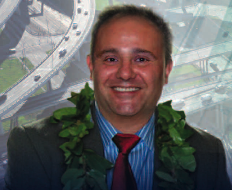Recently I gave a presentation on sustainability to the Graduate Seminar course in civil engineering (CEE 691). Along with it I was given a list of questions and asked to answer them in brief. The presentation can be found h e r e. The Q+A is shown below.
1. What is sustainable development?
Sustainability is still not uniquely and comprehensively defined – sustainable development may be an oxymoron: For example, if Oahu is not sustainable as is, any additional development is a move in the wrong direction. Sustainable “anything” likely means minimized impact to Earth.
2. Give specific ideas on how civil engineers can contribute to sustainable development.
Recycle demolition materials, tires, pavements and all used materials that can be reused. Build only highly cost effective and necessary infrastructure and structures. Develop synthetic substitutes from waste. Treat and reuse water. Find low impact substitute for Portland Cement Concrete.
3. What does “sustainability” mean for the state of Hawaii?
Minimize energy dependence. Manage population growth and suburban sprawl. Make recycling and intelligent technologies a top priority. Produce methanol from biomass. Widespread usage of solar roofs. Facilitate electric vehicles.
4. What new policies of President Obama are related to sustainable development? Which of his ideas will benefit civil engineering specifically?
He seems to be putting too much emphasis on renewables and some of them are terribly cost ineffective. For the needs of this county, only nuclear energy is a clean substitute. I have yet to see any major policies that lead to sustainable engineering and development. On the contrary, his intercity high speed rail initiative is a mistake. (See previous blog poist, part 3.)
5. What new policies of Governor Lingle are related to sustainable development?
The agreement with Better Place for enabling electric vehicles is a major one. Better Place works like a gas station. It's an electric vehicle battery station. You buy the car, they supply the batteries. The more you drive, the more frequently you need charged batteries, the more you visit them to exchange spent batteries with charged ones. It's like buying gas with frequent user discounts similar to cell phone minutes. Better Place will install battery swap stations at selected gas stations. A battery swap will take only a few minutes; similar or shorter than a gas fill-up. The concept takes the fear out of running out of batteries, having to reach home for a charge, and having to replace expensive battery arrays.
6. Were communities 1000 years ago more sustainable than modern society is?
The pre-medieval hunger, disease and murder put strong pressures on population, and low population is one way to keep resource consumption low, but we are way past those times. Besides, the open fires of that age created much more pollution (per capita) than the current industrialization.
7. When we look at the human history, each individual has become more specialized and different countries also become more dependent on each other through trade and “globalization”. Is this a good trend? Shall we reverse it?
From the ancient times, trade among tribes was widespread. We now see the modern evolution of it. The globalization of trade is accelerating with more people, companies and countries involved in it every day. It is a natural flow impeded only by artificial protectionist policies. What many people resent is the globalization of culture. This is a less desirable byproduct of a rapidly interconnecting human race. It is up to individual regions to keep traditions of their cultures alive.
8. Some in America consider our dependence on foreign oil as a national security issue. Please explain the reasons behind their thinking. Do you agree with them?
For most any county, national energy production and consumption characteristics and the national energy policy are key inputs its nation's sustainability and by integration, to international sustainability. Energy supply from abroad is a vulnerability (e.g., U.S. dependency on Saudi Arabia for oil, EU dependency on natural gas from Russia, etc.) It is a major political and economic challenge but it is debatable whether it rises to the level of national security. On the other hand, France and Japan seem to think so since the former is 80% and the latter aims to 50% of nuclear energy, which makes them much less dependent on fossil fuel supply and pricing.
9. Some countries in the world do not produce their own food, cars or airplanes. Their main resources are oil. They sell oil and then import all other goods that they need. Is their dependence on other countries’ food, cars and airplanes also a national security issue for them? What are your thoughts?
The oil cartel is an established oligopoly with major power and a corresponding ability to destabilize international markets. The provision of cars, food and other consumables is neither an oligopoly nor a cartel. They can be obtained from several competing sources. Thus, oil producing nations are (currently) at a major advantage.
Tuesday, April 7, 2009
Subscribe to:
Posts (Atom)



